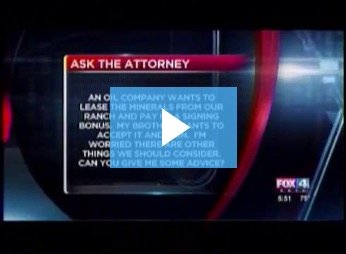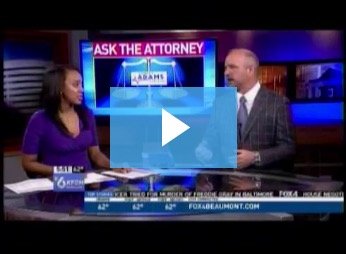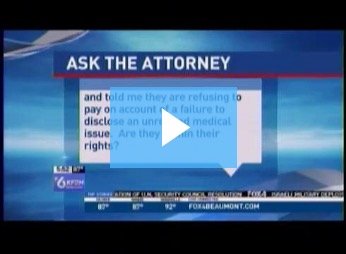The Impact of Pre-existing Conditions on Personal Injury Claims in Texas

If you’ve been injured in a car crash or a fall, you might worry that a pre-existing condition will prevent you from filing a successful personal injury claim. Many Texans who suffer from chronic illnesses, past injuries, or degenerative conditions fear that insurance companies will use their medical history against them to reduce or deny their claim. Fortunately, Texas law protects injury victims with pre-existing conditions who were harmed by another party’s negligence, although these claims can involve additional challenges and complex legal issues.
At Gilbert Adams Law Offices, we help injury victims in Beaumont, Southeast Texas and statewide understand their rights and fight back against unfair tactics that attempt to minimize their injuries based on conditions or events happening in the past. Read more below, and contact our law firm to discuss your situation with a skilled and experienced Texas personal injury lawyer.
What Are Pre-existing Conditions?
A pre-existing condition can be any health issue or injury that you had before the incident in question. Common examples of pre-existing conditions include:
- Degenerative disc disease
- Arthritis
- Previous back or neck injuries
- Asthma or other respiratory conditions
- Joint problems like knee or shoulder injuries
- Diabetes
- Heart disease
Pre-existing conditions can range from old sports injuries to chronic illnesses that may have little to do with the accident itself. Still, insurance companies often try to point to these conditions as a way to avoid responsibility for the harm caused by their insured.
The “Eggshell Plaintiff” Rule in Texas
Texas follows a well-established legal principle known as the “eggshell plaintiff” rule. This rule means that a defendant must take the injured person as they find them. In other words, even if a victim is more vulnerable to injury because of a pre-existing condition, the negligent party is still fully responsible for the harm they cause.
For example, suppose a person with a history of back problems is involved in a car wreck that worsens their condition. The fact that the victim’s back was already in a weakened state does not excuse the at-fault driver from liability. The negligent party is responsible for the new injuries and any aggravation of any alleged pre-existing condition.
How Pre-existing Conditions Can Affect a Personal Injury Claim
While Texas law protects injury victims with pre-existing conditions, these cases can be more complicated. Insurance companies may argue that the accident didn’t actually cause your injury but instead merely reflected the natural progression of your existing condition. They may also claim that you would have experienced pain or disability regardless of the accident.
This is a common tactic designed to avoid liability or limit the amount they have to pay. In these situations, having strong medical documentation is essential. You will need to prove that the accident either caused new injuries or worsened a pre-existing condition beyond what would have happened naturally over time.
Your attorney will work closely with medical experts to establish the difference between your condition before and after the accident. This comparison is key to showing that the accident directly impacted your health and quality of life.
Full Disclosure Is Essential
It is important to be completely honest about your medical history when filing a personal injury claim. Failing to disclose a prior accident or condition can severely damage your case because the insurance company and their lawyers will likely try to use it against you. Failing to disclose medical history can make you appear dishonest, even if the pre-existing condition had little or nothing to do with your current injuries.
Being upfront about your medical background gives your attorney the opportunity to address the issue directly and to build a strategy that accounts for any potential weaknesses in the case. Full transparency allows your legal team to position your claim in the best possible light.
Proving Aggravation of a Pre-existing Condition
One of the main challenges in these cases is proving that the accident aggravated or worsened a pre-existing condition. This typically requires a comparison between your medical condition before and after the incident. Medical records, imaging studies, and testimony from your treating physicians can all help establish this timeline.
Often, the key questions in these cases include:
- How were you functioning before the accident?
- Were you experiencing pain or limitations before the incident?
- Did the accident cause a noticeable increase in pain, physical restrictions, or the need for new treatments?
- Has your condition worsened in a measurable way since the accident?
If you were relatively stable before the accident and you became symptomatic afterward, your attorney can present this evidence to support your claim for damages.
How Insurance Companies Approach Pre-existing Conditions
Insurance adjusters will carefully comb through your medical records, sometimes requesting extensive documentation to find any sign of a prior injury or condition. Their goal is often to minimize the settlement amount by arguing that your injury was not fully caused by the accident or that you were already living with the same symptoms.
Some common insurance company tactics include:
- Arguing that your symptoms are solely related to your pre-existing condition
- Suggesting that the accident was a minor event that couldn’t have caused serious injury
- Offering a low settlement based on the assumption that much of your medical treatment would have been necessary even without the accident
An experienced personal injury attorney can push back against these arguments by presenting medical evidence, gathering expert opinions, and showing how the accident materially changed your condition and your life.
Can You Still Recover Compensation?
Yes. Even if you have a pre-existing condition, you are still entitled to recover compensation if another party’s negligence caused or made your injury worse. You may be able to recover damages for:
- Medical expenses, including treatments required due to the accident
- Lost wages if your ability to work has been affected
- Pain and suffering caused by the aggravation of your pre-existing condition
- Future medical care needed as a result of the accident
The key is to focus on how the other party’s negligence made your situation worse. The law does not allow the responsible party to escape liability simply because you were more vulnerable to injury.
Legal Help for Personal Injury Victims in Texas With Pre-existing Conditions
Pursuing a personal injury claim when you have a pre-existing condition is often more complex and requires careful handling. Insurance companies will use any opportunity to reduce or deny your claim, but that doesn’t mean you should walk away from the compensation you deserve.
At Gilbert Adams Law Offices, we have decades of experience standing up to insurance companies and protecting the rights of injury victims across Texas. We understand the unique challenges involved in cases with pre-existing conditions, and we know how to build strong, persuasive claims that fully account for the harm you’ve suffered.
If you or a loved one has been injured in an accident and are concerned about how your medical history might affect your claim, contact our office for a free consultation. We are here to listen, advocate, and fight for the compensation you are entitled to under Texas law.










